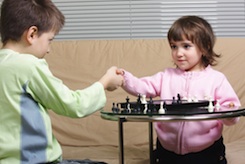
Custom Search
12 Ways to Help Your Kid Learn to be a Good Sport
Admin
Aprl 3, 2013
Participation in organized sports has a variety of benefits for kids, potentially boosting everything from their academic performance to their self-esteem. Kids who can’t manage their feelings after a loss or compete honorably because they’re so focused on winning, however, may not reap those benefits in the same way that their peers with good sportsmanship skills do. Helping your child learn the basics of being a good sport starts at home and extends to the playing field, and these 12 tips can help you to instill those qualities.
- Model Good Sportsmanship – Your children learn about social interaction largely through the observation of the adults they trust and admire, so one of the most effective ways of teaching your child to be a good sport is to model that behavior yourself. That means no yelling at coaches, referees or umpires when you think they made a bad call; you don’t want to pass those habits on to your child.
- Play Games of Chance from a Young Age – In order to learn how to lose gracefully, your children have to lose on occasion. While your first instinct may be to allow your child to win whenever possible, it’s important to play games of chance with her and to use the times when she loses as a teaching opportunity.
- Instill a Respect for Authority – Part of being a good sport is learning how to accept the calls a referee or umpire makes even if you disagree with them and to follow the directions of coaches. Those things require your child to have some semblance of respect for those authority figures.
- Avoid a “Winning is Everything” Attitude – When your child feels as if the only way he can please you is to win at all costs, he’s no longer focused on being a good sport, or even having fun while he competes. The entire focus of playing a sport shifts to obtaining a win, making it even more difficult for him to accept an inevitable loss.
- Observe Your Child During Practice – Watching how your child behaves during practice will give you an idea of the areas in which she needs a bit of instruction regarding good sportsmanship. If you’re never present for practice, it’ll be difficult for you to get an accurate picture of how she handles adversity on the field.
- Listen to Coaches – Training in good sportsmanship starts at home, but your child’s coaches will also have a strong impact on how he learns to behave. Take the time to listen to your child’s coaches during practice and games; if they’re not behaving well, they’re probably passing on those same bad habits to the kids on their team.
- Discuss More Than Final Results – After a game, it’s tempting to get into a discussion about the results of the game and how it could have gone differently. Rather than talking about the end score, look for highlights of your child’s performance to praise and opportunities to talk about the type of sportsmanship exhibited by the other players.
- Encourage Support of Teammates, Too – Being a good sport is more than just accepting a defeat gracefully; it’s also supporting your teammates. Even gifted kids who never complain about losing can be perceived as bad sports if they have a tendency to hog the ball or to try to make all the plays themselves.
- Don’t Assign Blame for Losses – When the results of a game don’t come out the way your child hopes, don’t place the blame for a loss at anyone’s feet. Just as you won’t want to tell your child that he’s solely responsible for an entire team’s loss, neither should you place that blame on his teammates or coaches.
- Avoid Minimizing Her Disappointment – Telling your child that “it’s just a game” after a loss may seem like an effective way of putting the loss into perspective and showing her that it isn’t all that important in the long run, but you’re actually minimizing her feelings. Let her know that it’s okay to be sad about a loss, but it’s more important to focus on how to do better next time.
- Keep the Big Picture in Mind – The proper perspective is everything when it comes to kids’ sports. Players on a varsity team will have more experience in both game play and losing than those on a youth soccer team, and you can’t expect your child to handle his first real taste of defeat gracefully when he’s six. Work on good sportsmanship, but realize that those skills will take time to fully develop.
- Establish a Policy of Congratulating the Winner – A good sport congratulates an opponent on a job well done, even if she’s sad that her team lost. Establishing an early policy of offering sincere congratulations to a victorious opponent places the groundwork for good sportsmanship as your child gets older.
- http://www.findananny.net/blog/12-ways-to-help-your-kid-learn-to-be-a-good-sport/

